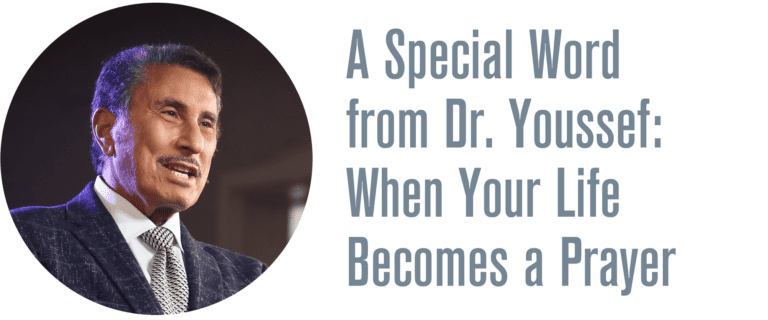In a world dominated by an entitlement mentality, it can be difficult to live a life of deep, Biblical gratitude. In this conversation, Jonathan Youssef and author Mary Mohler take time to discuss the types of gratitude displayed in Scripture, the hindrances to practicing abounding thankfulness, and our call to bear witness to the goodness of God.
This interview is condensed and excerpted from episode 117 of Candid Conversations with Jonathan Youssef. Listen today on your favorite podcast platform or online.
"All of the things God gives us are worthy of thanksgiving, but the bigger issue is who God is."
Jonathan: What were some of the personal experiences that drove you to write about gratitude?
Mary Mohler: It was the increasing mentality of entitlement, a lack of gratitude—the mentality that "I’m a pretty good person. I deserve all the best." When you take that attitude into the Christian realm, it’s ludicrous because every single breath we take is from the Lord—and, as believers, we should never get over the wonder of that. The prevailing thought in our minds should always be gratitude at every turn.
Gratitude really is a much bigger deal than you think. This is not about a list of things we need to be thankful for. This is the mentality of the heart. And whether gratitude is a prevailing part of your thinking or not is very telling as a believer. Our entitlement attitude has its roots in the Garden of Eden, where Adam and Eve could have every single tree but one—and that still wasn’t enough. Lack of gratitude is not a new problem—but it’s one that we need to stop minimizing.
The takeaway that changed my thinking and revolutionized my prayer life was Jonathan Edwards’ two different kinds of gratitude—one being the natural gratitude of counting your many blessings. That’s a Biblical mandate, but that’s a conditional gratitude. We’re thanking God for all these wonderful things He’s done.
There’s a higher form of gratitude that Edwards argued is supernatural, gracious, and not conditional. It’s relational. It is praising the Lord for who He is, and it doesn’t say anything yet about what He’s done. And so in my prayer life, I had to change my thinking and start with, "I praise You, Lord," for all of the attributes that I could think of—praising Him for all the things that He always is that I’ll never be because He is God. And then praising Him for the things that He is that I can hope to be in my sanctification and eventual glorification. That revolutionized gratitude for me. All of the things God gives us are worthy of thanksgiving, but the bigger issue is who God is. To be overwhelmed and in awe of Him is the key.
Jonathan: Hearing you delineate between natural and gracious gratitude is profound. If you feel like you have less to be thankful for, you can develop either an entitlement or a greedy mentality. And you lose that sense that even if everything were to be taken from me, God is still who He is. He’s still offered me this gift of eternal life, and I’m a child of God, chosen and elected and set apart. It’s a heart condition. What do you find are some of the hindrances that keep us from that heart of gratitude?
Mary Mohler: Some of us have a reluctance toward full-out gratitude because we are so burdened by loved ones who do not know the Lord and who continue to reject the Gospel. So it is hard for us to fully rejoice in all that we have and all that we look forward to for all eternity because we just can’t imagine that this person isn’t going to be there. This is where we have to ask, "Do you trust the Lord or not? Is He sovereign or not? Do you give this to Him? Do you realize He loves this person more than you do?"
The second one is the busyness mentality, "Yes, I’m grateful, but I don’t really have time to sit down and list why. But the Lord knows my heart; I’m grateful." It’s somewhat self-absorbed where you refuse to acknowledge that in every season of your life gratitude is a top-tier issue.
And then there are people out there who are suffering so greatly, and so it sounds almost insulting to be on my soapbox saying, "Be grateful." And they can say, "Well, if you were walking in my shoes . . ." But we have to gently speak the Truth that gratitude is not conditional; it’s more than being grateful when everything is going great. Gracious gratitude is toward the Lord for who He is.
Jonathan: Have you had moments where you’ve gone through either doubt or trial or suffering and have had to recall this to instruct yourself?
Mary Mohler: Sure. This is where I developed a habit from the words of a hymnwriter named George Mathison, who was credited with praying, "Lord, I’ve thanked You so many times for the roses, but I’ve never thanked You for the thorns." So I’ve started a "thorns" list next to my "roses" list. Those thorns can be very intense, so it takes some real effort to pray through that list and genuinely thank the Lord: "I didn’t ask for this thorn; I don’t enjoy this thorn. But I know that You are teaching me lessons through this situation that I wouldn’t have known otherwise."
Jonathan: How do we get over the entitlement mentality when it’s so deeply engrained in us? I think it’s our natural disposition, and on top of that, social media and the extreme self-care movement tell us not only that we can have it all but that we deserve it all. How do we wade through those waters and teach this to our kids?
Mary Mohler: We’re supposed to be salt and light, and we’re to be modeling this gratitude. One of my favorite tweets I’ve ever read is "A 5-year-old is just a crazy straw and some chocolate milk away from the best day ever." It’s just true. Fast-forward a few years, and if you’re not carefully, diligently teaching those children as you walk by the way and as you rise and sit, they are not going to be so thrilled by that crazy straw anymore. They’re going to want what somebody else has, and they are going to feel like they’re good kids—they deserve this. That’s going to be their natural, sinful inclination, so we as parents have to diligently and intentionally work against this mentality, teaching and modeling gracious gratitude for them.
Jonathan: Shouldn’t that be a mark of the church? Shouldn’t that be an aspect of what sets us apart as followers of Christ?
Mary Mohler: The way that you love and the graciousness about you is going to show people, just from the fragrance of Christ, that something’s different about you. They’ll think, "They thank us. They do kind things. They notice things in a way that other people don’t." And so yes, all of that does go together as a mark of who we are as believers who have been bought with a price and cannot do enough to show our gratitude toward the Lord and toward the people that He’s put in our path.
Share
Recent MY Journal

Is Culture Shifting Toward Christianity? (Candid Ep. 283)
May 7, 2025

An Open Door in the Middle East
May 6, 2025
Sign Up for Ministry Updates
You might also like
Prayer and Praise
When Your Life Becomes a Prayer
June 1, 2024
Prayer and Praise
That the Father May Be Glorified
August 8, 2023
Prayer and Praise
Exercise: God Wants to Meet You in Your Brokenness
September 1, 2022




